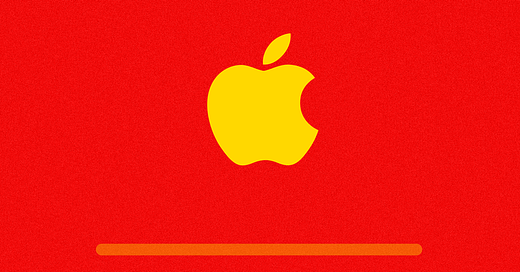The Apple shoe dropped on US-China issue that I’ve focused on quite a bit, as the leading headwind on the AI Tech front in the years to come. The markets around the world are trying to figure out what to make of it.
There’s a memorable episode in one of my favorite movies, ‘Thirteen Days’, a riveting film on the Cuban Missile Crisis, when the world’s two superpowers came close to nuclear conflict. In the film, Secretary of Defense Robert McNamara lectures a hapless Admiral for taking a ‘Rules of Engagement’ driven naval action that could have forced the Soviets to attack:
“This is not a blockade, Admiral!. This is language. A new vocabulary, the likes of which the world has never seen! This is President Kennedy communicating with Secretary Khrushchev!”
What the Admiral thought was a hostile action by a Russian ship was being interpreted correctly as it turned out, as a head of state to head of state communication via unorthodox means. The full scene and movie, both on YouTube, are highly recommended.
What brings this to mind is of course the above-mentioned China’s unexpected decision to ban Apple iPhones in some government employees, as the NYTimes explains:
“China may be making things tougher for Apple. Officials at government agencies were ordered not to use iPhones for work or bring them to workplaces, according to The Wall Street Journal. Bloomberg later reported that this would also apply to other government-controlled organizations, including state-owned enterprises. (Some Western governments, including the United States, already bar public employees from using TikTok, the Chinese-owned video platform, and devices made by China’s Huawei.)
Apple manufactures most of its hardware in China, and the country accounted for about a fifth of total revenue last year. Apple doesn’t break out iPhone sales in the country, but TechInsights, a market research firm, estimates that in terms of second-quarter shipments, China was a bigger market than the United States.”
“Apple is a big source of jobs in the country, and even if it wanted to shift operations, it would be difficult to replicate the best-in-class supply chain it has built in China over decades.”
The crux of the question for investors everywhere of course is:
“If one of the most successful operators in the world’s second-largest economy is at risk, can any Western company thrive there?”
The news of course has caused both Apple and Nvidia here, and China’s leading tech stocks, Huawei and SMIC, to lose 5-10% in value, translating into hundreds of billions of market cap. The thought that went through my mind, “This is President Xi, communicating with President Biden!”
Remember that China has been leaning into a more balanced dialog of late with the US despite the two countries’ long-running disputes on trades, AI semiconductors, and other technology curbs and bans.
I’ve written a fair bit on the two countries needing to ‘thread the needle’ on this complex relationship despite the political imperative on both sides to act and be tough for their domestic constituencies. After all, China just received the fourth senior US representative in Secretary of Commerce Gina Raimondo in China, a trip chronicled well by The Information’s Jessica Lessen. And the the overall reaction on both sides was that things were a bit upbeat.
Then we got the news of Chinese company Huawei managing to introduce a flagship phone with home-grown chip technologies that the US has banned, and that provoked political calls here for further restrictions on China.
So the Apple announcement by China (President Xi directly?) may have been a message in the language of diplomacy to the highest levels of the US government. This may be Cuban Missile Crisis style brinksmanship in the current era. Perhaps both sides step back from the brink.
We don’t know yet. Our Apple iPhone China crisis continues, with its own language between leaders. Storms ahead. Stay tuned.
(NOTE: The discussions here are for information purposes only, and not meant as investment advice at any time. Thanks for joining us here)









‘Loved reading this one.